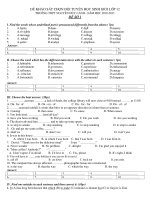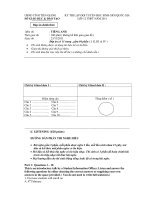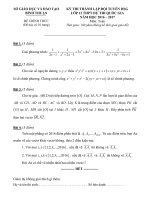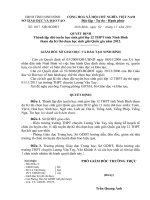đề thi thành lập đội tuyển học sinh giỏi 12
Bạn đang xem bản rút gọn của tài liệu. Xem và tải ngay bản đầy đủ của tài liệu tại đây (111.83 KB, 8 trang )
UBND TỈNH TIỀN GIANG CỘNG HÒA XÃ HỘI CHỦ NGHĨA VIỆT NAM
SỞ GIÁO DỤC& ĐÀO TẠO Độc lập - Tự do - Hạnh phúc
----------------- -----------------
KỲ THI LẬP ĐỘI TUYỂN HOC SINH GIỎI LỚP 12 THPT DỰ THI QUỐC GIA
Khóa ngày 04 tháng 12 năm 2007
Môn: ANH VĂN
Thời gian làm bài: 180 phút ( không kể thời gian giao đề )
( Đề gồm 8 trang )----------------------------------------------------------------------------------------
PART I : LISTENING COMPREHENSION: ( 2.0 pts )
Question 1: Listen to the conversations in the tape two times then pick out ONE best
option ( A,B,C or D ) in each question:
1. The car needs replacing
A. the front tyre on the driver’s side.
B. the front tyre on the passenger’s side.
C. both of the front tyres.
D. both of the rear tyres.
2. Finally, the tourist decides to book a wake-up call at
A. 6.30 o’clock B. 7.00 o’clock
C. 7.15 o’clock D. 6.45 o’clock
3. The patient goes to see the doctor because she has got
A. a headache B. a stomachache
C. a toothache D. a backache
4. The doctor tells the patient
A. to stay in bed for some days.
B. to take some medicines.
C. to stop reading and watching telly.
D. to have her eyes tested.
Question 2 : Listen to the conversations in the tape two times then pick out the
information to complete these sentences:
1. The boarding time for the flight to Manchester will be at_____________.
2. On the flight to Barcelona, the passenger may take on board__________piece(s) of
hand baggage.
3. How many passengers are there in the group that is checking in for the flight to Rome
at this moment?_____________________.
4. There is an electrical item in the suitcase of the passenger. It is the_______________
.
PART II :VOCABULARY AND GRAMMAR ( 8 pts )
Question 3: Pick out ONE best option ( A,B,C or D ) to completch sentence :
1. ………the cave was found, millions of visitors from many countries have come to
look at its beauty.
A. When B. Since
C. While D. Unless
2. This is the stone bed………the king had lain before he died in the 14
th
century.
A. however B. of which
Đ
ề
Đề chính thức
C. wherever D. where
3. It’s so long since I last saw him that I almost failed to………….him.
A. recognize B. receive
C. approve D. accept
4. The coal and steel industries are among the productions………..by the government.
A. control B. to control
C. controlling D. controlled
5. His play made a tremendous………….on audience.
A. result B. affect
C. impact D. collision
6. Unmarried middle-aged ladies usually dislike being called ……….although it is
technically the correct word to use.
A. old maids B. spinsters
C. maidens D. bachelors
7. She’s so………in doing her research that she never has time to relax.
A. involved B. included
C. complicated D. approved
8. I apologize. I shouldn’t……………. my temper.
A. have made B. have lost
C. have showed D. have given
Question 4 : Complete these sentences, using the suitable forms of the words in
brackets:
1. ………is one of the important factors that lead the firm to success.( managed )
2. I think he is the most………….in our village. Six members in his family died in the
last flood. ( fortunately )
3. Excuse me, Sir. I know it’s………..to call you up at two A.M. But our factory is on
fire! ( convenience )
4. All those foreign visitors can speak Vietnamese very well. There will be a big……..
to have a translator here. ( useful )
5. The natural disasters have…………..seriously the life of all people there.( effect )
6. Look at the doctor’s………….carefully before you take these tablets.( prescribe )
7. The behaviour of the woman is very…………The guard of the supermarket is having
a look on her. ( suspect )
8. Finally, the proposal of the students was………….yesterday. ( admission )
Question 5 : There are 8 errors in the passage below. Read the passage, find out these
errors then correct them.The number (o) is an example:
Social engagements follow rather definite rules of etiquette, but there are varying ( o.
degree-> degrees ) of formality and informality. Invitations for formal parties and
dinners and to such important occasions as weddings and graduations, is usually made in
writing on formal printed or engraved cards.Quite often the invitation will indicate the
type of cloth to be worn, but if this is not clear, it is perfectly permissible to telephone
the host or hostess to inquire about this.If the native costume of foreign visitors is
different with the usual local style of dress, it is always correct to wear the costume one
would wear at home for an occasion of comparable formality.
The person invited should never reply, as promptly as possible, to let the hostess
know whether or not he or she can accept the guests. Usually the hostess must plan for a
specific number of guests and any time in that number will also require changes in the
sitting arrangements, or in the amount of food to be prepared.
2
Before attending a social function to which he or she has been invited by a written
invitation , the guest may send a thank – you card to the hostess .
Question 6 : Choose ONE option ( A,B,C or D ) corresponding to the best sentence
which is made up from the given cue words.
1. / keep / she / rain / wait / minutes / night / I / ten / last /
A. She kept me to wait in the rain for ten minutes last night.
B. She kept me wait in the rain foe ten minutes last night.
C. She kept me to be waiting in the rain for ten minutes last night.
D. She kept me waiting in the rain for ten minutes last night.
2. / important / it / stop / father / your / smoke / once/
A. It’s important that your father should stop smoking at once.
B. It’s important that your father stopped smoking at once.
C. It’s important that your father stops smoking at once.
D. It’s important that your father may stop smoking at once.
3. / use / be / footballer / team / football / national / Huynh Duc / the best / of / our /
A. Huynh Duc used being the best footballer of our national football team.
B. Huynh Duc used to be the best footballer of our national football team.
C. Huynh Duc used to being the best footballer of our national football team.
D. Huynh Duc uses to be the best footballer of our national football team.
4. / hurt / she / boyfriend / learn / forget / birthday /
A. She was hurt when learning that had her boyfriend forgotten her bithday.
B. She hurt was when learning that her boyfriend had forgotten her birthday.
C. She was hurt that when learning her boyfriend had forgotten her bithday.
D. She was hurt when learning that her boyfriend had forgotten her birthday.
5. / highway / now that / take / get / build / hours / there /
A. Now that the highway has been built, it takes only two hours to get there.
B. Now that the highway has been built, it took only two hours to get there.
C. Now that the highway has been built, it is taking only two hours to get there.
D. Now that the highway has been built, it has taken only two hours to get there.
6. / stupid / it / give up / him / job / money / need /
A. It was stupid with him to give up his job when he needed the money.
B. It was stupid to him to give up his job when he needed the money.
C. It was stupid of him to give up his job when he needed the money.
D. It was stupid for him to give up his job when he needed the money.
7. / survive / we / unless / work / start / cleaner / safer / energy / sources /
A. We won’t survive so we start working on cleaner,safer sources of energy.
B. We won’t survive although we start working on cleaner, safer sources of
energy.
C. We won’t survive unless we start working on cleaner, safer sources of energy.
D. We won’t survive otherwise we start working on cleaner, safer sources of
energy.
8. / grateful / I / me / kindness / visit / last month / your factory /
A. I’m grateful for your kindness to me when I visited your factory last month.
B. I’m grateful with your kindness to me when I visited your factory last month.
C. I’m grateful of your kindness to me when I visited your factory last month.
D. I’m grateful at your kindness to me when I visited your factory last month.
PART III : READING ( 6.0 pts )
Question 7 : Read the passage below then pick out ONE best option ( A,B,C or D ) in
each question :
3
I left school at fifteen. I was an academically bright lad who was urged by some of his teachers
not to leave, but I wanted out, to see life, and I didn’t want to reach beyond the expectation of the
friends who left school with me. I worked for a year in a laundry, as a van-boy delivering dry
cleaning.
On turning sixteen I applied to be, and eventually began working as, a trainee heating engineer
with a medium-sized company in East Belfast. The first months were boring. The work was not
demanding but I found the environment of the factory annoying. I remember my first week .I left
the factory to meet up with a friend and I realized that I had forgotten to collect my wages. My
friend thought I was an idiot. After many months working in the factory, I was sent off to college
to study for my Certificate in Heating Engineering. I found the classroom routine unpleasant and
I remember feeling a sense of limitation. Five years of this- to end up as a heating engineer and
continue with that for the foreseeable future was not an exciting thought.
Although I had left school against the advice of my teachers I had, without telling anyone, tried
to continue my studies in literature at evening classes. It was a boring walk from one end of the
city to another and to sit amongst adults was confusing. I was the youngest in the class, so the
companionship I knew at school was absent. I put up with it for a short period. It was too long a
walk on cold winter’s nights and it was hard to concentrate on Shakespeare with wet shoes and
soaking trousers. So I carried on reading books and started writing poetry at home.
By chance, I won some prizes and literary awards in national competitions. A young woman
from a TV company came to the college one day. She told me in the quiet of the corridor that I
had won a national poetry award. I stared at her in astonishment and disbelief. She wanted to
make a short film about me, to which I said: ‘ No, I couldn’t do that.’ Not that I had any real
excuse. I was just frightened. She eventually persuadedme that I should do it the following day.
Off I went to Shaws Bridge, on the outskirts of Belfast.They made a short film of me reading one
of my poems and I was forever after occupied with a fascination for words.I wondered what I
should do after this, and decided some weeks later that I could not stand the idea of spending the
rest of my days dealing with pipes. So one evening, I hesitatingly told my parents that I wanted
to return to school.They were shocked and, I think, a little afraid but they did not try to persuade
me not to. They wanted to know if I was sure, if I knew what it meant and whether I was aware
that if I gave up my training it would be very difficult to get a good job.But nothing could put me
off, and they pursued the matter no further.
1. One reason why the writer left school at the age of fifteen was that he
A. thought he would get a good job.
B. had no other choice.
C. didn’t get on well with his teachers.
D. didn’t want to be different from his friends.
2. What did the writer feel while he was training to be a heating engineer?
A. He didn’t receive enough money.
B. He preferred the college to the factory.
C. He was capable of doing something better.
D. He might fail to qualify as a heating engineer.
3. What did the writer find when he attended the evening classes?
A. The behaviour of the other students annoyed him.
B. The studies were less interesting than he expected.
C. He was out of place among the other students.
D. He learned more when he studied at home.
4. What does “ it “in ‘ I put up with it for a short period.’ refer to ?
A. companionship
B. the walk
C. literature
D. the evening class
5. Why at first did the writer refuse to appear in the film?
4
A. He felt he didn’t deserve it.
B. He was taken by surprise.
C. He thought someone else should be in it.
D. He wanted more time to think about it.
6. Why didn’t he go on with his poetry writing at home?
A. He was too busy with his studying at college.
B. He couldn’t earn enough for his life.
C. He didn’t want to spend all his life sitting at one place thinking and writing.
D. His parents wanted him to return to the college.
7. How did the writer’s parents react to his decision to return to school?
A. They argued with him.
B. They pointed out how it would affect his future.
C. They told him he was making a mistake.
D. They hid their real thoughts from him.
8. What would be the most suitable title for this extract?
A. A change of direction
B. Great expectations
C. An unlucky beginning
D. Pressures of fame
Question 8 : Fill in each numbered blank with ONE suitable word to complete the
passage below:
New drivers could be asked to play a sophisticated video game as part of their training and
driving test, under proposals to be announced by transport ministers next week. The Department
of Transport has been considering a test devised by researchers which tests people’s “ hazard and
perception…( 1 )…”, that is how quickly they are aware of a dangerous situation and how
quickly they react to it.This is a particular weak point of new and learner drivers.
Dr Frank McKenna, the psychologist heading the £200,000 research project, says: ‘…( 2 )...
people, despite popular belief and, particularly their own estimation of their driving, do not have
faster reaction times than older drivers. Although they may be slightly quicker once they notice
something dangerous, they are much…( 3 )…at spotting a possible crisis.
Dr McKenna says that the video is a much better tool for training and testing than written
questionnaires, which were an alternative suggestion put forward in a consultation paper by the
department last August:”…( 4 )…may be cheaper, though they are quite expensive to mark, but
there is no relationship between being good at answering the questions and being good at
avoiding accidents.”
Rather than developing a…( 5 )…programme involving high technology, Dr McKenna has
concentrated on a scheme that could be carried out quickly and cheaply.” There will be no
excuse for not implementing this test.”
Drivers being assessed watch a ten-minute video and push a button as soon as they see a
dangerous …( 6 )….While some of the situations on the video were acted by the research team,
several were not, including a dangerously wobbly cyclist who cuts across traffic to go along the
white line in the middle of the road, and a woman stepping out into the traffic from a bus stop.
Dr McKenna is working on research funded by the Economic and Social Research Council on
how drivers judge their own driving skills. His preliminary work suggests that people usually
think that their skills are above average which of course, is a nonsense statistically .
Indeed, in one…( 7 )…survey in the US not one person from a large sample thought their skills
were below average.
He believes that one way of reducing road deaths is to get people to realize that they are not
as good as they think. He gets them to think of an accident they have…( 8 )…and then to
5









